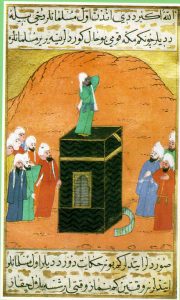 “Bilal: A New Breed of Hero” brings to life a Middle Eastern story about freedom. Directed by Ayman Jamal and Khurram H. Alavi, the film was created in Dubai and was the first CGI epic in that country. “Bilal” premiered in Dubai in 2015 before being released in North Africa and throughout the Middle East. Now, this Muslim epic has been translated into English and is available in America.
“Bilal: A New Breed of Hero” brings to life a Middle Eastern story about freedom. Directed by Ayman Jamal and Khurram H. Alavi, the film was created in Dubai and was the first CGI epic in that country. “Bilal” premiered in Dubai in 2015 before being released in North Africa and throughout the Middle East. Now, this Muslim epic has been translated into English and is available in America.
“Bilal” follows the story of Bilal, a boy who is kidnapped by slave traders as a child. He and his sister are sold to the rich man Umayyah ibn Khalaf. Umayyah and his son, Safwan, are cruel to both slaves and freemen alike. Bilal repeatedly runs afoul of his masters as he ages including a notable moment when he is whipped for saving his sister’s life when Safwan tries to kill her. Safwan intended to use her as a living archery target simply because she happened to be passing by where he was practicing. Bilal, however, comes to her rescue and fights off Safwan and the other boys.
Bilal’s situation does not improve as he ages, but he exchanges his bitterness and anger for kindness. In one of the early scenes with the adult Bilal, Bilal gives his own food to a hungry child. The child was going to rob one of the many idols in the streets, and Bilal knew that doing so would attract the wrath of the priests. It is immediately after this that Bilal meets Abu Bakr, the “Lord of Merchants,” and is introduced to the idea that all men are created equal. Bilal has several more conversations with Abu Bakr and comes to believe in this idea of equality. It echoes what Bilal’s mother told him as a child, “Being a great man means living without chains.”
Bilal’s beliefs in equality are finally exposed, and he is brutally punished. Umayyah leaves Bilal without food or water for days before urging Bilal to become a spy. Bilal refuses and is pinned beneath a massive boulder. Abu Bakr, who sees Bilal’s agony, buys Bilal from Umayyah for twice what he is worth. Umayyah, however, refuses to sell Abu Bakr Bilal’s sister as well. Umayyah claims that he gave her to his son, Safwan, as a gift. Safwan, in his typical cruelty, refuses to sell her.
Bilal is freed and later uses his freedom to join Abu Bakr and some of Bilal’s old friends in fighting back against the slavers when they come to attack Bilal’s new home. The slavers are defeated, and Bilal confronts Safwan one final time. In an earlier confrontation, Safwan implied that he had killed Bilal’s sister. At the end of the movie, however, Safwan reveals that he spared her saying it was “my one act of morality.” Years after their separation, Bilal and his sister are reunited.
The final scene of the movie echoes the ending of “The Prince of Egypt.” Bilal stands before the assembled people and presses his hands to the side of his head, the traditional position of a mu’adhin when they call out the famous Islamic Call to Prayer.
“Bilal” repeatedly emphasizes the idea that all people are equals and created by the same God. Bilal refuses to refute this idea, even when it might cost him his life. This message is powerful, and Bilal’s bravery is inspiring.
Westerners are most familiar with animated movies being aimed at children. Put this assumption out of your mind. Bilal has colorful clothing, beautifully animated scenery and carefully rendered sequences depicting dreams and young Bilal’s imaginings, but it is not a movie for young children. “Bilal” does not shy away from the horrors of slavery or the violence of the times. There is a scene that depicts a slave auction, and slaves, including Bilal, are whipped more than once in the film. “Bilal” also does little to tone down the tortures Bilal underwent when Umayyah wanted him to give up his fate. The scene when a huge boulder is laid on top of Bilal would likely disturb young children. Instead, “Bilal” should be attended by those old enough to appreciate the context of the story but still young enough to be swept up in the colorful world Bilal inhabits.
“Bilal” also represents a chance for young teens and preteens to encounter a story beloved by Muslims. “Bilal” is based on the story of one of the first converts to Islam, Bilal ibn Rabah, who was chosen to be the first mu’adhin by Muhammad himself. He was known for his deep, beautiful voice and is still beloved by many Muslims today. Exposing young teens to a story so steeped in Islamic history is an excellent way to expand their cultural horizons while still carrying such an inspiring message about freedom and equality.


